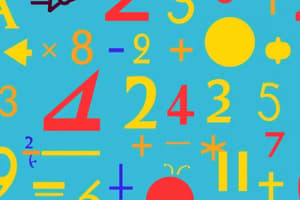Podcast
Questions and Answers
Which mathematical field is most directly concerned with developing algorithms to approximate solutions to equations that cannot be solved analytically?
Which mathematical field is most directly concerned with developing algorithms to approximate solutions to equations that cannot be solved analytically?
- Abstract Algebra
- Discrete Mathematics
- Numerical Analysis (correct)
- Mathematical Analysis
In the context of algebra, which of the following best describes the primary focus of Boolean algebra?
In the context of algebra, which of the following best describes the primary focus of Boolean algebra?
- Analyzing the properties of integer rings and fields.
- Performing operations on binary values such as 0 and 1. (correct)
- Operating on continuous variables to model physical systems.
- Solving polynomial equations with real coefficients.
If a dataset exhibits a bell-shaped distribution, which probability distribution is most likely to be used to model it?
If a dataset exhibits a bell-shaped distribution, which probability distribution is most likely to be used to model it?
- Poisson distribution
- Normal distribution (correct)
- Binomial distribution
- Exponential distribution
Within the context of calculus, what fundamental concept connects differentiation and integration?
Within the context of calculus, what fundamental concept connects differentiation and integration?
Which area of mathematics is essential for secure communication and heavily relies on the properties of prime numbers?
Which area of mathematics is essential for secure communication and heavily relies on the properties of prime numbers?
Which branch of mathematics deals with the study of graphs, which are used to model relationships between pairs of objects?
Which branch of mathematics deals with the study of graphs, which are used to model relationships between pairs of objects?
What is the primary focus of differential geometry?
What is the primary focus of differential geometry?
In statistics, what is the purpose of inferential statistics?
In statistics, what is the purpose of inferential statistics?
How does analytic geometry relate algebra and geometry?
How does analytic geometry relate algebra and geometry?
When evaluating the expression $5 + 3 \times 2 - (8 / 4)$, which operation should be performed first according to the order of operations?
When evaluating the expression $5 + 3 \times 2 - (8 / 4)$, which operation should be performed first according to the order of operations?
Flashcards
What is Mathematics?
What is Mathematics?
The abstract science of number, quantity, and space.
What is Arithmetic?
What is Arithmetic?
The study of numbers and their properties, including addition, subtraction, multiplication, division, exponentiation, and roots.
What is Algebra?
What is Algebra?
A branch of mathematics that uses variables to represent numbers and solve equations.
What is Geometry?
What is Geometry?
Signup and view all the flashcards
What is Calculus?
What is Calculus?
Signup and view all the flashcards
What is Statistics?
What is Statistics?
Signup and view all the flashcards
What is probability?
What is probability?
Signup and view all the flashcards
What is Discrete Mathematics?
What is Discrete Mathematics?
Signup and view all the flashcards
What is Number Theory?
What is Number Theory?
Signup and view all the flashcards
What is Numerical Analysis?
What is Numerical Analysis?
Signup and view all the flashcards
Study Notes
- Mathematics is the abstract science of number, quantity, and space.
- Mathematics can be used as a pure science, or applied to other disciplines.
Arithmetic
- Arithmetic involves studying numbers, mainly the properties of traditional operations like addition, subtraction, multiplication, division, exponentiation, and extraction of roots.
- A field is any set of objects upon which all of these operations can be performed.
- Arithmetic operations follow a specific order of operations: Parentheses, Exponents, Multiplication and Division, Addition and Subtraction (PEMDAS).
Algebra
- Algebra is a branch of mathematics that generalizes arithmetic, using variables to represent numbers.
- Elementary algebra deals with solving equations and inequalities.
- Linear equations can be solved by isolating the variable on one side.
- Quadratic equations can be solved by factoring, completing the square, or using the quadratic formula.
- Abstract algebra extends the concepts found in elementary algebra to more general structures, such as groups, rings, and fields.
- Boolean algebra operates on binary values (0 and 1) and is fundamental to digital logic.
Geometry
- Geometry focuses on the properties and relations of points, lines, surfaces, solids, and higher dimensional analogs.
- Euclidean geometry, based on Euclid's axioms, deals with the properties of space, distances, angles, and shapes.
- Analytic geometry uses algebraic techniques to study geometric problems, often using coordinate systems like the Cartesian coordinate system.
- Trigonometry studies the relationships between the sides and angles of triangles, particularly right triangles, and uses trigonometric functions such as sine, cosine, and tangent.
- Differential geometry employs calculus to study the properties of curves and surfaces.
- Topology studies the properties of geometric objects that remain unchanged under continuous deformations such as stretching and bending.
Calculus
- Calculus is concerned with the study of continuous change.
- Differential calculus deals with the rate of change (derivatives) and slopes of curves.
- Integral calculus deals with the accumulation of quantities (integrals) and the areas under and between curves.
- The fundamental theorem of calculus connects differentiation and integration.
- Calculus is used in physics, engineering, economics, and computer science.
Statistics and Probability
- Statistics involves the science of collecting, analyzing, presenting, and interpreting data.
- Descriptive statistics focuses on summarizing and presenting data through measures such as mean, median, mode, variance, and standard deviation.
- Inferential statistics involves drawing conclusions and making predictions based on a sample of data.
- Probability theory is the study of randomness and uncertainty, providing a framework for calculating the likelihood of events.
- Random variables are variables whose values are numerical outcomes of a random phenomenon.
- Probability distributions describe the likelihood of different outcomes for random variables.
- Common distributions include the normal distribution, binomial distribution, and Poisson distribution.
Discrete Mathematics
- Discrete mathematics studies mathematical structures that are discrete rather than continuous.
- Logic deals with reasoning and proof techniques, and it is fundamental to computer science.
- Set theory deals with collections of objects and operations on them.
- Graph theory studies graphs, which are mathematical structures used to model pairwise relations between objects.
- Combinatorics is concerned with counting and arranging objects.
Number Theory
- Number theory is a branch of mathematics devoted primarily to studying integers and their properties.
- Prime numbers, divisible only by 1 and themselves, are fundamental to number theory.
- Divisibility rules provide shortcuts for determining whether a number is divisible by another number.
- Modular arithmetic deals with the remainders of numbers after division.
- Cryptography relies heavily on number theory for secure communication.
Mathematical Analysis
- Deals with the rigorous study of calculus concepts.
- Focuses on limits, continuity, differentiation, integration, and infinite series.
- Real analysis studies real numbers and functions.
- Complex analysis extends calculus to complex numbers.
- Functional analysis studies vector spaces and linear operators.
Numerical Analysis
- Develops algorithms for solving mathematical problems.
- Approximates solutions to problems that are difficult or impossible to solve analytically.
- Key areas: root finding, interpolation, numerical integration, and solving differential equations.
Studying That Suits You
Use AI to generate personalized quizzes and flashcards to suit your learning preferences.




